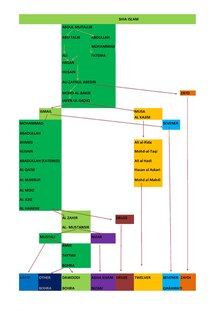Abū l-Qāsim at-Taiyib
Abū l-Qāsim at-Taiyib ( Arabic أبو القاسم الطيب, DMG Abū l-Qāsim aṭ-Ṭaiyib ) is the 21st Imam of the Musta'li-Tayyibi - Ismailis . According to Tayyib, these are also called Tayyibites or Ṭayyibī ( Arabic طيبي) after the last (twenty-first) imam recognized by them. According to the tradition of the Tayyibite Musta'lites, he is the son of al-Amir (1096–1130), the 20th Imam of the Ismailis .
The majority of the Musta'lis believed that at-Tayyib had disappeared, but that he was in a concealment like the Mahdi , as the Ismailis originally believed of Muhammad ibn Ismail .
Among the Musta'lites , a distinction is made between the Tayyibites ( al-Ṭayyibiyya ) and the Hafizites ( al-Ḥāfiziyya ), who recognize al-Hafiz , the Fatimid ruler of Egypt between 1130 and 1169 as a legitimate imām, and not at-Tayyib. The Hafizites lost all support after the fall of the Fatimid dynasty; today's Musta'liyya are all Tayyibites .
The Musta'li Tayyibi Ismailites include Dawudi Bohras , Sulaimani Bohra and Alavi Bohra and others. a.
literature
- Stern: The Succession to the Fatimid Imam al-Amir (Oriens; PDF; 2.3 MB)
- Farhad Daftary : The Isma'ilis: Their History and Doctrines ( online excerpt )
- Farhad Daftary: Brief History of the Ismailis . 2003
References and footnotes
- ↑ cf. List of Imams of the Ismailis
- ^ Daniel McLaughlin: Yemen . 2007, p. 25 ( online excerpt ) - half jokingly this author describes the group of Musta'lites (Hafizites) also as “Nineteeners” (which here in German would correspond to the term “Neunzehnerschiiten”) and the Tayyibites as “Twenty Oners ”('Twenty-one Shiites '), analogous to the Five Shiites , Seven Shiites and Twelve Shiites .
- ↑ According to Rudolf Fischer, scant remnants of the Tayyibites persecuted by the Sunni reaction are still in northern Yemen today . (Rudolf Fischer: Der Islam. Faith and social system in the course of the times. An introduction. Edition Piscator (1992), p. 55, online excerpt ).
| personal data | |
|---|---|
| SURNAME | Abū l-Qāsim at-Taiyib |
| ALTERNATIVE NAMES | Abū l-Qāsim Ṭayyibī; أبو القاسم الطيب (Arabic); طيبي (Arabic) |
| BRIEF DESCRIPTION | 21. Imam of the Musta'li Tayyibi Ismailis |
| DATE OF BIRTH | 12th Century |
| DATE OF DEATH | 12th century or 13th century |
